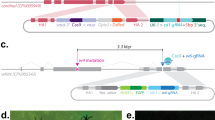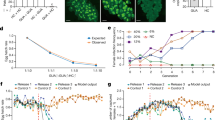Abstract
Culex pipiens fatigans is the chief vector of filariasis in south-east Asia. Urbanization has often caused the numbers of this mosquito—and with it the danger of filariasis infection—to increase alarmingly1. The natural vigour, tolerance and fast development of resistance to insecticides of this mosquito necessitate the development of other control methods, and cytoplasmic incompatibility2 seems to be an ideal means.
This is a preview of subscription content, access via your institution
Access options
Subscribe to this journal
Receive 51 print issues and online access
$199.00 per year
only $3.90 per issue
Buy this article
- Purchase on Springer Link
- Instant access to full article PDF
Prices may be subject to local taxes which are calculated during checkout
Similar content being viewed by others
References
Mattingly, P. F., Butt. WHO, 27, 579 (1962).
Laven, H., Z. f. indukt. Abst. Vererbl., 88, 443, 478 (1957).
Laven, H., Nature, 177, 141 (1956).
Laven, H., in Genetics of Insect Vectors of Diseases (edit. by Wright, J. W., and Pal, R.) (Elsevier Publ. Co., Amsterdam, in the press, 1967).
Author information
Authors and Affiliations
Rights and permissions
About this article
Cite this article
LAVEN, H. Eradication of Culex pipiens fatigans through Cytoplasmic Incompatibility. Nature 216, 383–384 (1967). https://doi.org/10.1038/216383a0
Received:
Revised:
Published:
Issue Date:
DOI: https://doi.org/10.1038/216383a0
This article is cited by
-
Different mechanisms of X-ray irradiation-induced male and female sterility in Aedes aegypti
BMC Biology (2023)
-
Aedes aegypti exhibits a distinctive mode of late ovarian development
BMC Biology (2023)
-
The cellular lives of Wolbachia
Nature Reviews Microbiology (2023)
-
A mass rearing cost calculator for the control of Culex quinquefasciatus in Hawaiʻi using the incompatible insect technique
Parasites & Vectors (2022)
-
Transgenic expression of Nix converts genetic females into males and allows automated sex sorting in Aedes albopictus
Communications Biology (2022)
Comments
By submitting a comment you agree to abide by our Terms and Community Guidelines. If you find something abusive or that does not comply with our terms or guidelines please flag it as inappropriate.



